Best 20 Gallon Air Compressor - Top 10 Rankings + 1 Gas Powered Pick
Updated: 17-September-2023
Are you looking for the best 20 gallon air compressor to power your pneumatic nail gun for finishing your home renovation project? Or maybe you need to power your impact wrench to get some automotive work done in your home garage.
From inflating your car’s tires at your home to powering nailers, nibblers, paint spray guns and air ratchets in your professional workshop, a 20 gallon air compressor is an indispensable piece of equipment for DIY as well as professional applications.
In today’s post we present our findings on the best 20 gallon air compressor you can have with you whether its your home or your workshop. So, without further due, let’s begin.
We would highly recommend reading the science piece at the end of the rankings that intuitively explains how PSI, CFM and Gallon – the three most important air compressor specifications work.
Ranking the 10 Best 20 Gallon Air Compressors
We have conducted a thorough market research to compare popular models of 20 gallon air compressors to find the best based on a combination of performance, ergonomics and user feedback factors. So, without further due, we hereby present our top 11 recommendations.
10
Eagle EA-6500
Good 20 Gallon Air Compressor for Painting
Our Rating: 7.9 / 10
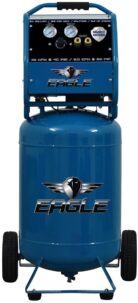
This Eagle EA-6500 compressor delivers 6 CFM of air at 90 PSI and 7.9 CFM at 40 PSI with a maximum tank pressure capacity of 125 PSI. One unique feature of this equipment is the design of panel where pressure gauges are installed giving it an operator panel feel and appearance. It also runs quiet and fits a wide variety of DIY as well as professional applications.
Pros
Shortcomings
9
Campbell Hausfeld DC200000
Our Rating: 8.0 / 10
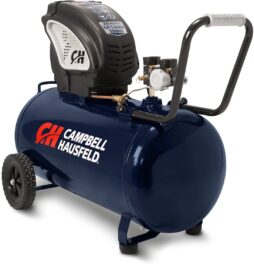
The Campbell Hausfeld DC200000 is a horizontal 20 gallon air compressor delivering 4 CFM of air at 90 PSI and 5 CFM at 40 PSI with a maximum tank pressure capacity of 150 PSI.
From airing ties on your diesel truck and blowing out air filters to powering your pneumatic cutoff wheel, this compressor will take care of a majority of DIY and home garage jobs. It will also take care of your hobby painting.
Pros
Shortcomings
Tidbit
We've been using the term CFM and PSI above. CFM stands for Cubic Feet per Minute. It is a unit of air flow (also referred to as air delivery). PSI stands for Pounds per Square Inch. It is a unit of pressure. CFM and PSI are the two most basic specifications of compressors.
8
NorthStar Electric Air Compressor
Great All-Rounder
Our Rating: 8.3 / 10
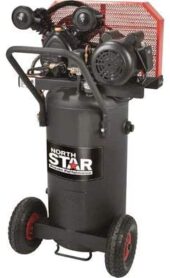
NorthStar features again on our list with its 20 gallon electric and vertical air compressor powered by a 2 HP electric motor delivering 5 CFM of air at 90 PSI and 6 CFM at 40 PSI. It runs at 115 V but can be rewired to run at 230 V.
Like its gas powered model, this electric model is also backed an impressive 4-year warranty for consumers and 2-year warranty for commercial use. Its solid cast iron pump construction and ASME certified air tank is built for commercial shop use.
It will run plasma cutters, air ratchets, pneumatic nailers and other air tools with ease and will be a great fit for any shadetree mechanic.
Pros
Shortcomings
7
Porter-Cable PXCMF220VW
Best 20 Gallon Air Compressor for Automotive Applications
Our Rating: 8.4 / 10
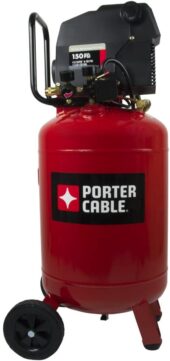
Porter-Cable 20 gallon vertical air compressor delivers 4 CFM of air at 90 PSI and 5 CFM at 40 PSI and a maximum tank pressure capacity of 150 PSI. It has a UL and CSA certified tank and is powered by a 1.5 HP electric motor.
From inflating the tires of your car to powering your pneumatic wrench, it will take care of your automobile in a wide variety of tasks making it the best 20 gallon air compressor for automotive applications.
Pros
Shortcomings
6
WEN 2202
Best 20 Gallon Air Compressor for Home Use
Our Rating: 8.5 / 10
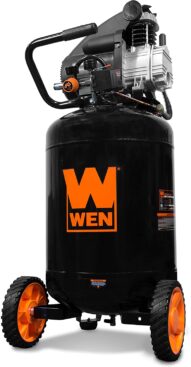
This WEN 20 gallon air compressor delivers 3.8 CFM of air at 90 PSI and 5.0 CFM at 40 PSI from a reinforced steel tank to fulfill the pneumatic requirements of your woodworking power tools as well as common home applications making it the best 20 gallon air compressor for home use. Also works great with painting and air tools used in home use.
Pros
Shortcomings
5
Husky C201H
Lightweight | Great Portability
Our Rating: 8.6 / 10
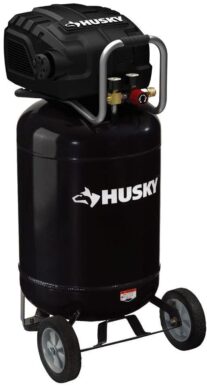
This Husky 20 gallon vertical air compressor delivers 4 CFM of air at 90 PSI and 5.5 CFM at 40 PSI. Its tank pressure capacity is at an impressive 175 PSI sitting at the very top of the competition. Its performance and capacity makes it fit for a wide variety of DIY and professional applications.
Pros
Shortcomings
4
Ingersoll-Rand P1.5IU-A9
Very Quiet Air Compressor
Our Rating: 8.8 / 10
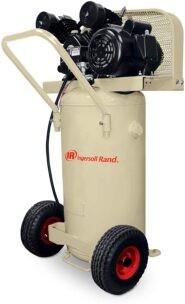
This Ingersoll-Rand air compressor is vertical 20 gallon air compressor delivering 5.2 CFM of air at 90 PSI and 5.8 CFM at 40 PSI. At 135 PSI tank pressure capacity, it is a worthy recommendation for DIY as well as professional applications with the ability to run common pneumatic power tools.
It will run your impact wrench, tire machine, paint guns, DA sanders and even a nibbler making it a great fit for your garage DIY works.
Pros
Shortcomings
3
Dewalt DXCMPA1982054
Best 20 Gallon Horizontal Air Compressor
Our Rating: 8.9 / 10
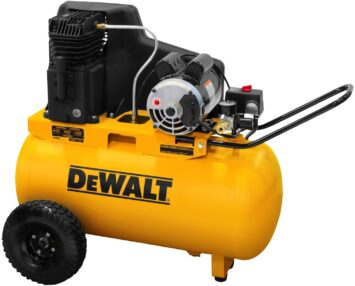
The Dewalt DXCMPA1982054 has a cast iron, twin-cylinder oil lubricated pump at its heart powered by a 1.9 HP electric motor designed for 120-Volt power outlets but can also be converted to fit 240-Volt requirements. It delivers 5.7 CFM of air at 90 PSI and 7 CFM at 40 PSI.
It has a quiet operation with the capacity to handle air brushing, pneumatic bolting, finish and framing nailing, roof nailing and paint spraying applications making it the best 20 gallon horizontal air compressor on our list.
This compressor has a heavy and sturdy built. You'd need help for loading it on a truck. In usability, it will run all of the impact tools required in auto repairs as well as enable you to complete that car restoration and painting project.
Pros
Shortcomings
2
Industrial Air Belt Driven IL1682066.MN
Best 20 Gallon Air Compressor for Home Garage
Our Rating: 9.0 / 10
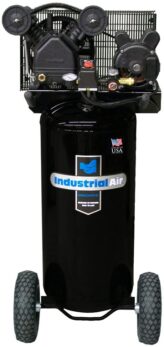
This Industrial Air 20 gallon air compressor is UL certified and CSA listed. It has a cast iron vertical tank and compressor construction making it a little heavier, however, pneumatic tires cover it up allowing easy portability.
At 1.6 HP of power, it has air delivery capacity of 5.3 CFM at 90 PSI and 6.2 CFM at 40 PSI that is sufficient to run your pneumatic drill, sander, air ratchet, paint sprayer and impact wrench with ease making it the best 20 gallon air compressor for home garage.
This compressor will run your CNC plasma cutter as well as your air wrench, pneumatic finish nailer, powder coating gun and air chisel. It will sit in the corner of your garage to remain at your service as well as move out for blowing out the sprinkler lines.
Pros
Shortcomings
1
EMAX Hulk HP02P020SS
Best Overall | Extremely Quiet
Our Rating: 9.7 / 10
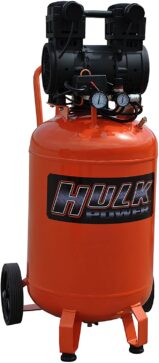
This EMAX Hulk 20 Gallon Air Compressor is a vertical air compressor delivering 5.77 CFM and 90 PSI and 8.39 CFM at 40 PSI. Its compressor’s heavy gauge steel construction runs at a power of 2 HP but is the quietest 20 gallon air compressor on our list with its sound level rated at 41 dBA.
From operating your 1/2" impact wrench for undoing lug nuts to running plasma cutters, pneumatic brad nailers, air ratchets and impact guns, this compressor will take care of a variety of jobs. As a professional detailer or painter, this compressor will operate your tornador smoothly.
Backed by a 2-year warranty, it is the best 20 gallon air compressor on our list.
Pros
Shortcomings
Honorable Mention - Gas Powered Air Compressor
NorthStar Gas Powered Air Compressor
Best Quiet 20 Gallon Air Compressor
Our Rating: 8.7 / 10
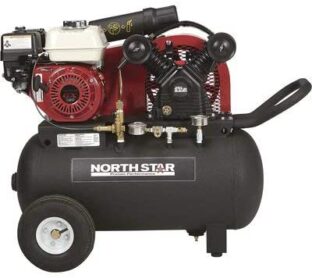
This NorthStar 20 gallon air compressor is powered by a Honda GX160 OHV engine and is the only gas powered air compressor on our list. It has a cast iron compressor construction and V-cylinder design for improved performance.
The factor that stands out in this model is the 4-year extended consumer warranty and 2-year commercial warranty that shows the confidence NorthStar has on its product.
With an outstanding airflow capacity of 13.7 CFM at 90 PSI, it is the best 20 gallon air compressor for painting.
Pros
Shortcomings
Understanding the Relation Between CFM, PSI and Gallons in an Air Compressor
The three most basic specifications in any air compressor are its Airflow Rating (CFM), Pressure Rating (PSI) and its Tank Capacity (Gallons).
What is the correct interpretation of these specifications? Let us explain in a simple and intuitive way.
First, remember that you don’t draw air from the air compressor, you draw it from the tank.
The electric motor (or gas engine) driven air compressor’s function is to keep the tank pressurized. When you switch the air compressor on, it starts pumping air into the tank.
Have you ever inflated a balloon with your breath? Have you felt it gets harder and harder with each blow? and you feel the air trying to get back into your mouth as you blow into the balloon more and more.
Similarly, the compressor blows air into the tank. The tank is made of solid metal so it can’t inflate like a balloon to make more space for the more and more incoming air. However, the compressor doesn’t stop and keeps blowing air causing the air to get compressed inside the tank.
The pressure capacity rating of the air compressor (expressed in PSI i.e., pounds per square inch) is a measure of how powerful the compressor is in keeping to blow air into a pressurized tank and resist the air trying to get back (like a balloon being inflated trying to blow the air back into your mouth) as well as the structural capacity of the tank to sustain pressure without bursting.
The moment you connect any tool with the tank, that pressure finds a way out. When you squeeze the trigger of your air ratchet, that pressure is finding its way out while the mechanical structure of the tool takes advantage of that pressure release and converts that into useful motion. Hence your tool runs on air.
The more the pressure, the more powerful tool you can run because a greater pressure will be able to fight a greater resistance (like a stuck nut or bolt) and make the tool overcome that resistance.
However, after removing the resistance, the air has to release somewhere. It’s not like the tool consumes the air. It just takes advantage of the energy inside the air and lets the air go. This is where the air compressor’s airflow rating comes in (in CFM i.e., cubic feet per minute).
While you are using the tool, the tank is being emptied as of the air travels through the hose to the tool and into the atmosphere. When the tank empties, it loses its pressure. How fast this is happening is expressed by the tool’s CFM rating.
For example, brad nailers can work on 1-2 CFM because their mechanism inherently draws short bursts of air from the tank.
On the other hand, air guns and paint spray guns need 4-5 or even more CFM because their mechanism is based on drawing a lot of air from the tank and using not only the air pressure but the air itself to get the job done.
As the tool draws more and more air from the tank, its pressure drops. However, that 4-5 CFM airflow needs to have the pressure to overcome the resistance the tool offers. This is where the compressor kicks back in and re-pressurizes the tank.
This remains a competition between the tool and the compressor. Tool empties and tank that causes loss of pressure while the compressor blows more and more air into the tank to maintain its pressure. As long as the compressor is winning this fight, your tool works fine.
This is how CFM and PSI rating are connected with each other with respect to air compressor mechanism as well as the mechanism of the connected tool.
However, where is the third most important specification, the Gallon rating in all of this?
Just understand the tank as the buffer. It is a buffer that allows the compressor to rest while your tool keep drawing air from the tank. The compressor kicks in when this buffer level gets low. The Gallon rating can be visualized as the size of this buffer.
On a smaller tank capacity, say 15 gallon, the compressor will have to kick in again and again faster because a 15 gallon tank will loose its pressure more quickly. If your tool draws too much CFM, smaller gallon rating would mean stopping between work to let the compressor re-pressurize the tank.
On the other hand, if you have let’s say a 40 gallon tank, the compressor can rest while you keep drawing the CFM for greater duration. It would mean uninterrupted work and less noise (because of less compressor kick-ins).
So this is how the CFM, PSI and Gallon work together.
Buyer's Guide Questions
What can a 20 gallon air compressor do?
A 20 gallon air compressor can power air tools like brad nailers, air ratchets, impact guns, air chisels sanders and nibblers. They can also power painting and finishing tools like powder coating guns and paint spray guns. Therefore, they can serve as a good home workshop compressor. They can also power some of your bigger home workshop tools like an air cut off wheel.
For home use, you may use them for blowing sprinkler lines or operating a floor blowing gun. They can also inflate your truck tires and blow its air filter making them a good option for garage work.
Can I paint a car with a 20-gallon compressor?
Technically speaking, 20-gallon air compressors can be used to paint a whole car but it is not going to be as convenient. However, spot painting and touchups are definitely not an issue with a 20-gallon compressor.
Is a 20 gallon air compressor big enough?
A 20 gallon air compressor is big enough to handle a wide variety of DIY as well as professional applications including running your woodworking tools or other workshop pneumatic tools. These tools may include finish nailers, framing nailers, brad nailers, paint spray guns, air brushes, air wrenches and pneumatic sanders.
Which is better oil or oilless air compressor?
When comparing 20 gallon portable air compressors, an oil free air compressor is better as it reduces maintenance by eliminating the need for oil replacement. No oil also means that the effect of extreme climates will be comparatively lower as oil viscosity factor will be eliminated.
Will a 20 gallon air compressor run an impact wrench?
A 20 gallon air compressor can not only run an impact wrench but many other air tools as well like nailers, air ratchets and air chisels. The important thing is to match the PSI rating an CFM rating of the compressor with the tool which is not hard as a wide variety of 20 gallon air compressors have sufficient pressure and airflow rating to run air tools.
If you like our post and the information we have presented, please do give your valuable feedback and share this article with your friends.